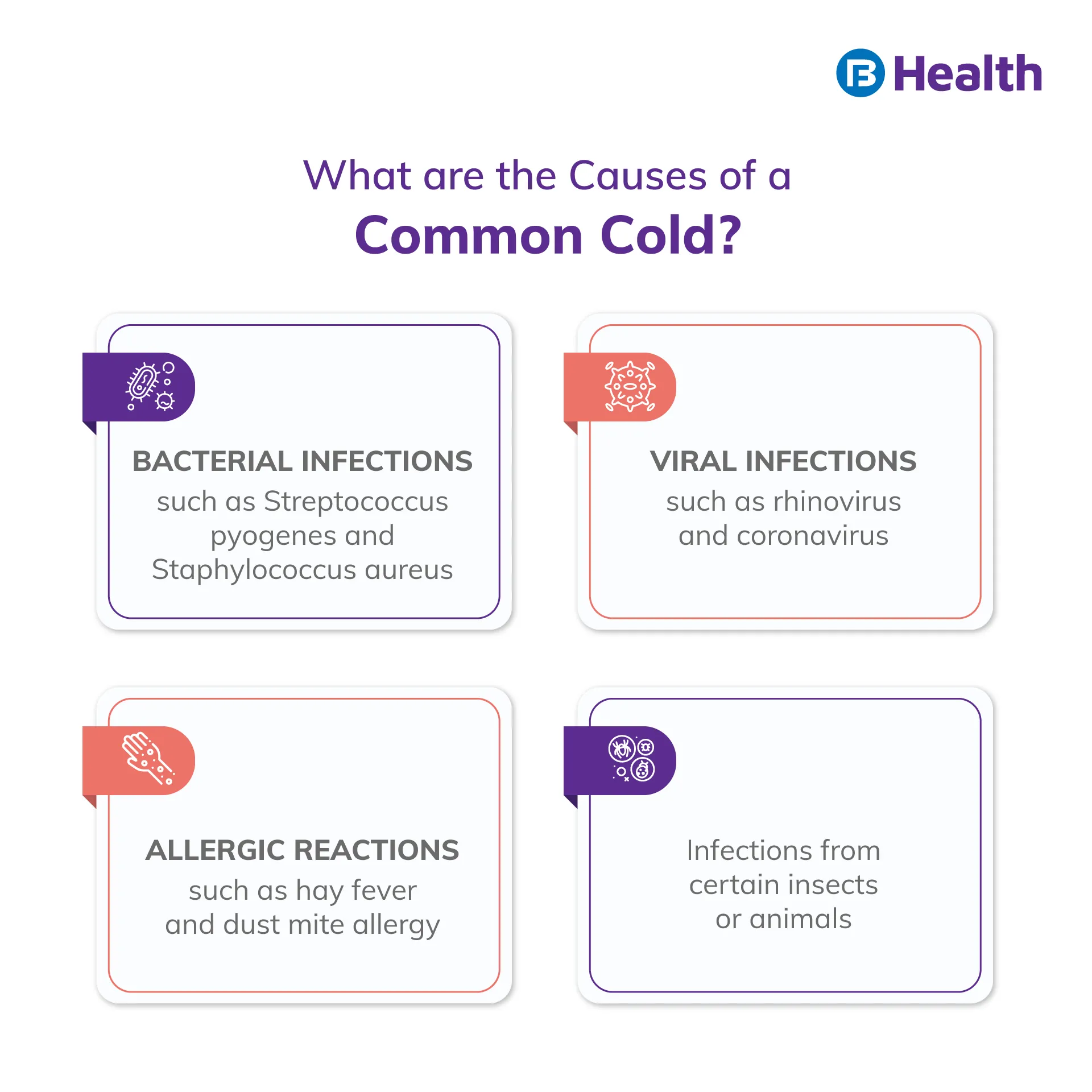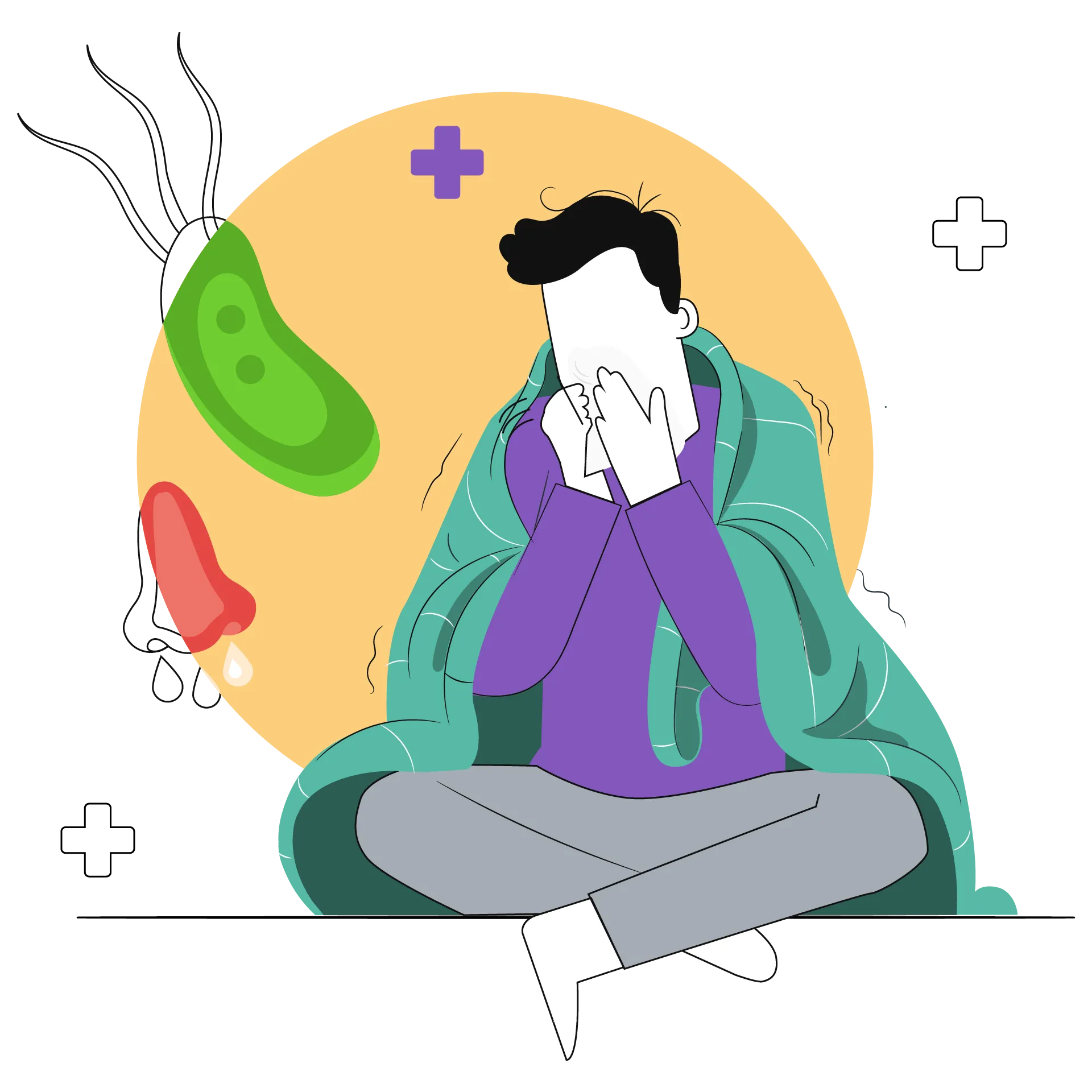General Physician | 6 min read
Common Cold: Symptoms, How to Treat and Diagnosis
Medically reviewed by
Table of Content
Synopsis
The common cold is a respiratory infection caused by a virus. It's also known as 'sniffles' - because a runny nose and sore throat often characterise it. In general, symptoms of the common cold include sore throat, coughing, runny nose and body aches.
Key Takeaways
- Common colds are easily treatable if diagnosed early
- We can avoid the common cold by taking care of personal hygiene
- Proper nutrition in our food can help us prevent catching a common cold
A respiratory ailment that affects the nose and throat is known as the common cold. You can get it if you breathe in certain viruses, such as rhinoviruses, responsible for about 80% of all colds. [1] The common cold is the most common illness in humans and affects more than 200 million people every year. [2] The most common symptom of a cold is a runny or stuffy nose, followed by coughs and sneezes.
The virus that causes the common cold can be spread through air droplets or direct contact with an infected person. For example, touching your nose with your fingers after you've had contact with someone who has already been exposed to germs can spread it further.
If you're reading this, here's what you need to know about the common cold that can help you treat and prevent it.
Common Cold Causes
The common cold is caused by a virus spread through droplets in the air when someone with cold coughs or sneezes. Colds are most common in winter and early spring. The most common causes of the common cold include:
- Viral infections, such as rhinovirus and coronavirus
- Bacterial infections, such as Streptococcus pyogenes and Staphylococcus aureus
- Allergic reactions, such as hay fever and dust mite allergy
- Infections from certain insects or animals

Common Cold Symptoms
A cold is caused by viruses that infect cells in your nose, throat, and lungs. There are several types of viruses, but they all cause a similar set of symptoms:
- Nasal congestion
- Sore throat
- Headache
- Fatigue
- Sneezing and coughing
- Coughing fits
What Distinguishes A Flu from a Common Cold?
It is a short-term condition that affects the nose, throat, and sinuses. It is caused by a virus (like the flu) lasting two to seven days. Most people who get the common cold don't need any treatment. However, older people, those sick with other illnesses, or have compromised immune systems may need to take over-the-counter medications to manage symptoms.
The flu is also an illness caused by viruses. Symptoms include fever, headache, body aches, coughing, sore throat (throat pain), sneezing, and nasal congestion. The flu lasts for about a week and can make you tired or lethargic. You might also experience stomach pain, diarrhea, or vomiting. If you have flu symptoms, you should stay home from work or school until your fever and symptoms subside.
Additionally, you should refrain from using public transportation if you have flu-like symptoms and avoid touching your eyes, nose, or mouth with unwashed hands.

Common Cold Treatment for Adults and Children
Get plenty of rest:
When it comes to treating the common cold, the first thing you need to do is get plenty of rest. Avoid physical activity during the day, and ensure you drink enough fluids
Take over-the-counter cold medicine:
Over-the-counter cold medicine is a great way to fight off those symptoms and make sure they don't come back too soon. Many over-the-counter medications for treating a cold work better than others, like Zyrtec or Vicks VapoRub. You can also take alternative medicines that are safe for children, such as ginger root tea or echinacea supplements
Decongestants:
These medications work by constricting blood vessels to reduce congestion in the nose. Decongestants will make you feel better sooner, but they do not cure the common cold. You can buy decongestant nasal sprays without a prescription at most grocery stores or drug stores
Antibiotics:
If your doctor prescribes antibiotics for your infection, take the medication as directed and continue to follow up with your doctor to make sure that it remains effective against future infections. You should also follow up with your doctor regularly during treatment because antibiotics may not always work effectively against all types of bacteria that cause the common cold
Vitamin C:
Vitamin C is an antioxidant nutrient that helps prevent oxidative damage from free radicals in the body's cells caused by viruses like influenza A and B., which can lead to chronic conditions.Drink fluids:
The common cold is the most common illness of the year and can be a real pain. You might have been dealing with it for a while, but now you're ready to take it on. It's important to stay hydrated when you have a cold. Drink plenty of water, fruit juices, and other fluids throughout the day—even if you don't feel thirsty. This will help keep your body from dehydrating, which can worsen symptoms. It's also important to stay well-hydrated if you're taking antibiotics or other medicines.
Stop smoking tobacco:
Tobacco contains chemicals that can weaken the immune system and make you more susceptible to viruses such as the common cold. You need to stop smoking tobacco products immediately after taking medicine since it may worsen symptoms instead of helping them go away faster; also, avoid second-hand smoke wherever possible.
Additional Read: What is Cold UrticariaCommon Cold And Children
The common cold is a minor respiratory infection lasting one to two weeks. It is more common in children than adults, especially those under five years old. If your child has a common cold, here are some steps you can take to help keep them healthy:
- Get your child to drink plenty of fluids (2-3 cups per day)
- Give your child honey to help ease the sore throat
- Apply an over-the-counter decongestant if needed (available at most drug stores)
- Use a humidifier in their bedroom if they have stuffy noses at night (and keep it on until symptoms improve)
Diagnosing Common Cold
To diagnose a common cold, you must rule out other medical conditions that cause similar symptoms. For example, mononucleosis (mono) is caused by the Epstein-Barr virus. It causes symptoms similar to the common cold, such as fever, fatigue, swollen lymph nodes, sore throat, and loss of appetite. If symptoms last longer than a week, it is essential to visit a doctor.
Common Cold Prevention
Some common prevention methods for the common cold are:
- Wash your hands
- Clean and disinfect surfaces
- Avoid close contact with sick people
- Avoid touching your eyes, nose, and mouth
- Get a flu shot (and keep it up-to-date)
If you get sick, drink plenty of fluids (water is best) and use a humidifier in the room where you spend most of your time. A cough drop or lozenge can help with severe symptoms; they're sold over-the-counter at drugstores, but not all doctors recommend them because they contain menthol, which may cause dry eyes or mouth irritation.
Additional Read: Ayurvedic Treatment for Cold and CoughThe best way to stay healthy is to make sure you're getting the right amount of sleep and plenty of exercise—and if you suspect that your cold is more serious, don't hesitate to get medical help. You can consult a doctor online by visiting Bajaj Finserv Health anytime without any hassle.
References
- https://bmcinfectdis.biomedcentral.com/articles/10.1186/s12879-018-3568-9
- https://www.ncbi.nlm.nih.gov/books/NBK279543/
Disclaimer
Please note that this article is solely meant for informational purposes and Bajaj Finserv Health Limited (“BFHL”) does not shoulder any responsibility of the views/advice/information expressed/given by the writer/reviewer/originator. This article should not be considered as a substitute for any medical advice, diagnosis or treatment. Always consult with your trusted physician/qualified healthcare professional to evaluate your medical condition. The above article has been reviewed by a qualified doctor and BFHL is not responsible for any damages for any information or services provided by any third party.





